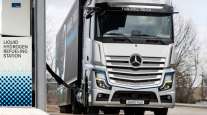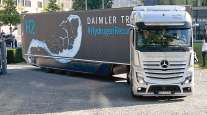DTNA Sees Gains in Mexico Despite ‘Difficult’ Conditions
This story appears in the Nov. 18 print edition of Transport Topics.
GUADALAJARA, Mexico — The new head of Daimler Trucks North America’s operations in Mexico got his baptism under fire on Nov. 12 as he opened the first press conference of the nation’s largest truck show here.
Stefan Kurschner, who took over Sept. 1 after serving as president of DTNA’s Detroit Diesel Remanufacturing, told reporters that “market conditions are still difficult” in Mexico but that he believed 2014 would be a good year.
“I have very big expectations,” he said.
Daimler is No. 2 in Classes 6-8 truck sales, behind a Paccar Inc. subsidiary with about 50% of market share.
But, Kurschner said, DTNA is “the largest truck producer in Mexico and the largest truck exporter in Mexico.”
DTNA employs some 5,300 workers at its two production plants in Mexico and exports a sizeable portion of its output to the United States.
While sales are reasonably robust, Kurschner said they are not high enough, especially when considering the amount of manufacturing activity going on in Mexico.
He said there were still too many trucks older than 20 years on the road here missing safety systems, emissions controls and the fuel-efficiency gains of later models.
Mexico doesn’t have the strict emissions regulations that are common in the United States, so fleets are able to keep running trucks as long as they wish.
He told the mostly Mexican press corps gathered here before the official start of the Expotransporte truck show: “After 40 years here, we are a Mexican company.”
Kurschner said DTNA was making “important investments” in the country, including a $45 million renovation and expansion at its plant outside of Mexico City.
Daimler also operates a state-of-the-art plant in Saltillo that opened in 2009.
Kurschner said that the Mexican economy was recovering from the recession and was benefiting from the move to “nearshore” more foreign production for the U.S. market from Asia to North America.
But one potential problem, he said, is confusion over a major tax restructuring program the federal government is trying to impose.
He said there was concern that companies might be reluctant to invest in equipment until it was clear what effect the tax changes might have on their operations.
Kurschner, who conducted the press conference in Spanish, has been with Daimler since 1993 in various positions.




